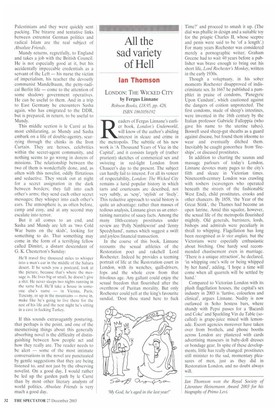All the sad variety of Hell
Ian Thomson
LONDON: THE WICKED CITY by Fergus Linnane Robson Books, £18.95, pp. 428, ISBN 1861056192 Readers of Fergus Linnane's earlier book, London's Underworld, will know of the author's abiding interest in sleaze and crime in the metropolis. The subtitle of his new work is 'A Thousand Years of Vice in the Capital', and it consists largely of (rather prurient) sketches of commerical sex and swiveing in red-light London from Chaucer's day to the present. The subject can hardly fail to interest. For all its veneer of respectability, London: The Wicked City remains a lurid popular history in which tarts and courtesans are described, not very subtly, as 'sexy', 'stylish' or 'lively'. This reductive approach to social history is quite an advantage: rather than masses of tedious analysis, Linnane gives us an entertaining narrative of saucy facts. Among the many 18th-century prostitutes under review are 'Polly Nimblewrist' and 'Jenny Speedyhand', names which suggest a swift and joyless financial transaction.
In the course of this book, Linnane recounts the sexual athletics of the Restoration poet and rakehell Lord Rochester. Indeed he provides a teeming portrait of life at the Restoration court in London, with its wenches, quill-drivers, fops and the whole crew from that frivolous age. Any gallant could enjoy the sexual freedom that flourished after the overthrow of Puritan morality. But only Rochester could yell at the king's favourite sundial, `Dost thou stand here to fuck
Time?' and proceed to smash it up. (The dial was phallic in design and a suitable toy for the priapic Charles II, whose sceptre and penis were said to be 'of a length'.) For many years Rochester was considered merely a pornographic writer; Graham Greene had to wait 40 years before a publisher was brave enough to bring out his short life, Lord Rochester's Monkey, written in the early 1930s.
Though a voluptuary, in his sober moments Rochester disapproved of indiscriminate sex. In 1667 he published a pamphlet in praise of condoms, 'Panegyric Upon Cundum', which cautioned against the dangers of coition unprotected. The first condoms, made of sheep's intestines, were invented in the 16th century by the Italian professor Gabriele Falloppia (who gave his name to the uterine tubes). Boswell used sheep-gut sheaths as a guard against disease, but found them irksome to wear and eventually ditched them. Inevitably he caught gonorrhea from 'fireships', or diseased prostitutes.
In addition to charting the saunas and massage parlours of today's London, Linnane devotes many pages to the city's filth and sleaze in Victorian times. Nineteenth-century London was crawling with toshers (scavengers who operated beneath the streets of the fashionable West End), child prostitutes, crooks and other chancers. By 1858, 'the Year of the Great Stink', the Thames had become an open latrine. Amid this squalor, however, the sexual life of the metropolis flourished mightily. Old generals, barristers, lords, bishops and admirals were peculiarly in thrall to whipping. Flagellation has long been recognised as le vice anglais, but the Victorians were especially enthusiastic about birching. One hardy soul recommended chastisement even in marriage. 'There is a unique attraction', he declared, 'in whipping one's wife or being whipped by her hand', adding, 'I hope a time will come when all quarrels will be settled by hand.'
Compared to Victorian London with its plush flagellation houses, the capital's sex industry in 2003 is 'furtive, colourless and clinical', argues Linnane. Nudity is now outlawed in Soho hostess bars, where shandy with Pepsi passes for a 'Bacardi and Coke' and Sparkling Vin du Table (socalled) is grape-juice mixed with lemonade. Escort agencies moreover have taken over from brothels, and phone booths across London are plastered with cards advertising masseurs in baby-doll dresses or bondage gear. In spite of these developments, little has really changed: prostitutes still minister to the sad, momentary pleasures of men, just as they did in Restoration London, and no doubt always will.
Ian Thomson won the Royal Society of Literature Heinemann Award 2003 for his biography of Primo Levi.


























































 Previous page
Previous page